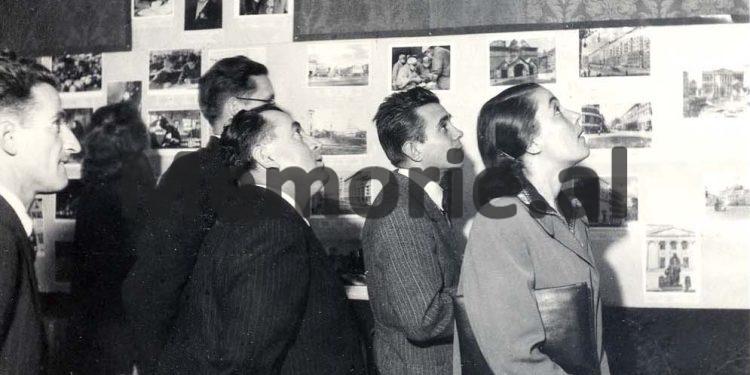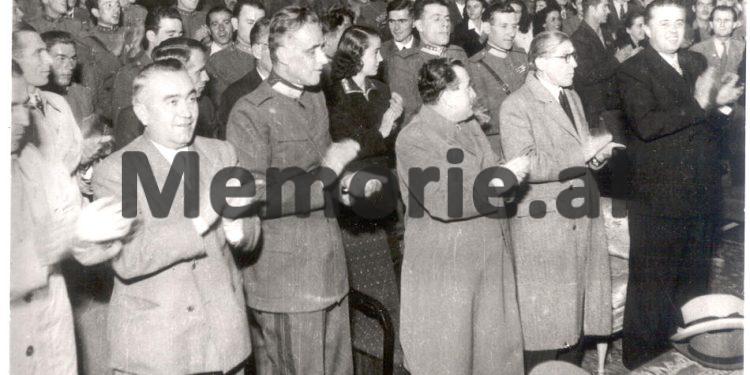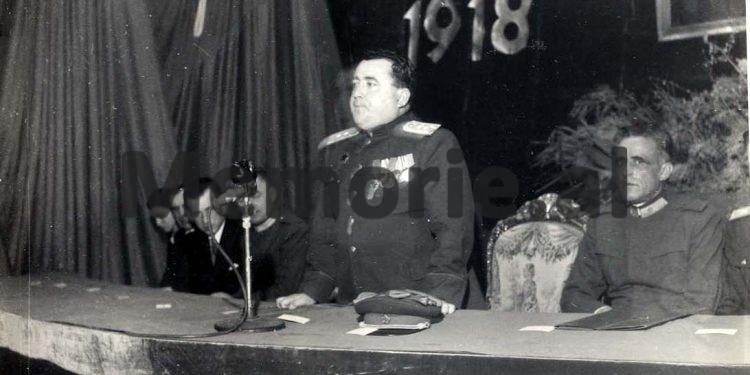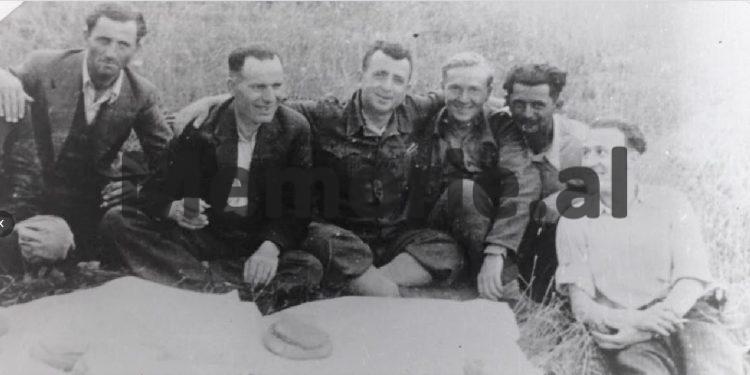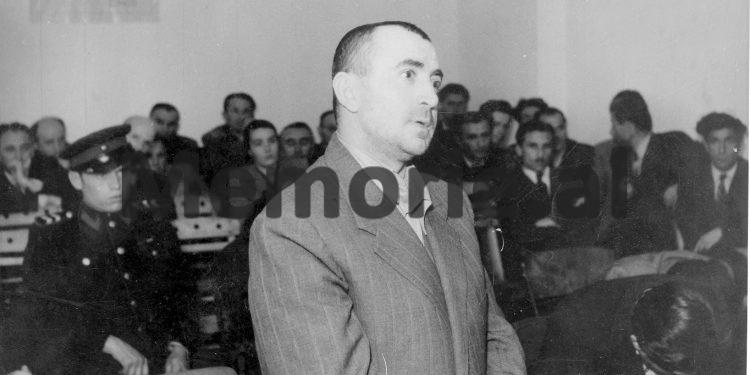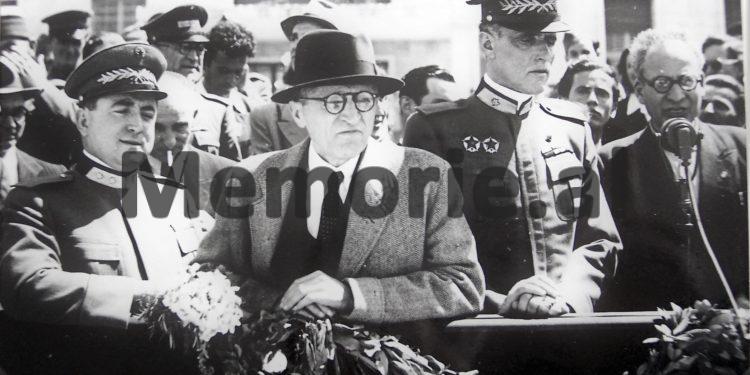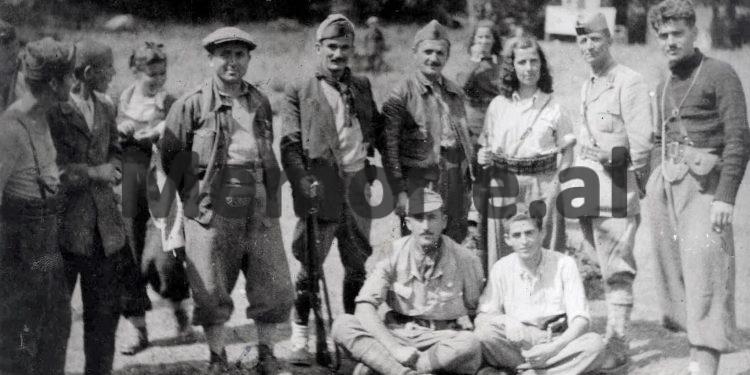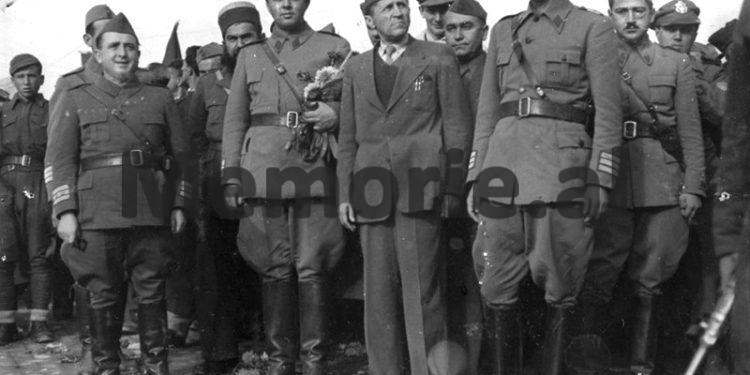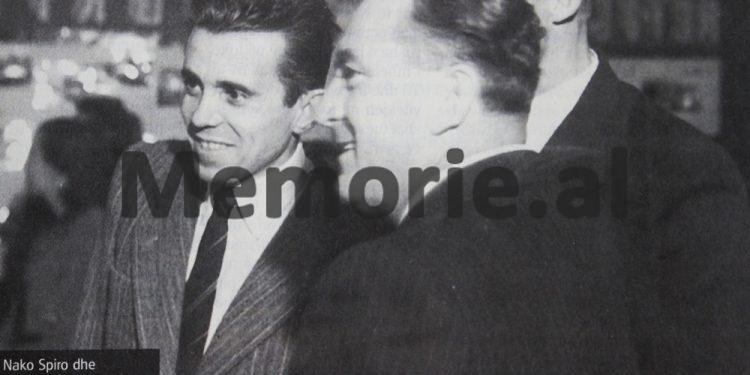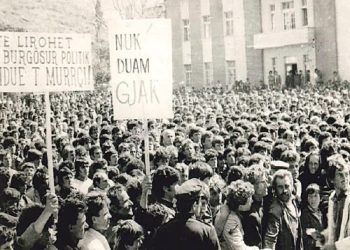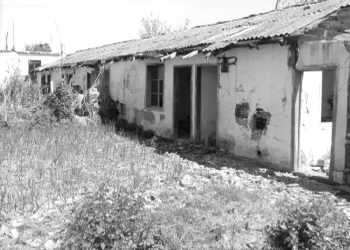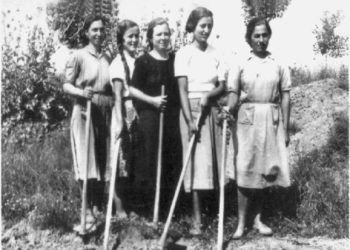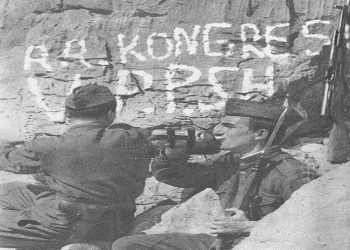Dashnor Kaloçi
The third part
Memorie.al publishes the rare and unknown story of Koçi Xoxe originally from Cologne, but born in 1911 in the village of Negovan in Florina, Greece, where their family had settled for economic reasons, who after studying and graduated with honors in the classical gymnasium of Thessaloniki in 1929, where he became acquainted for the first time with the communist ideas and literature of the Marxist-Leninist groups operating in Greece at that time, returned to the city of Korça, later becoming one of the founders of the first cell communist in Albania and vice-president of the Communist Group of Korça, since the early 1930s, chairman of the Society ‘Puna’ in 1936, where in the elections held that year, the people of Korça elected him as chairman of the Municipality, but was not allowed by the government of King Zog, as he had been arrested and imprisoned several times for communist activities. Koçi Xoxe’s participation in the founding meeting of the Communist Party of Albania in November ’41, (where he went a day late, because he was busy organizing the demonstration on November 7 of that year in the city of Korça where he remained killed the young communist, Koci Bako), where for his great contribution to the communist movement, he was elected in absentia, as a member of the Provisional Central Committee, and later as a member of the General Staff of the National Liberation Army since July 10, 1942 at the Labinot meeting, the delegate to the Përmet Congress on May 24, 1944, where he was promoted to lieutenant general, and at the Berat meeting in October of that year, he was elected deputy prime minister headed by Enver Hoxha. Xoxa’s brilliant career immediately after the end of the War, climbing the ranks of the party and state hierarchy, as organizational secretary of the Albanian Communist Party, member of the General Presidency of the Democratic Front of Albania, member of the People’s Assembly, Minister of Internal Affairs and Deputy Prime Minister of the ‘democratic government’, being the number two figure of communist Albania, after Colonel-General Enver Hoxha. Unknown photos and rare testimonies of his two sons, Genc and Fatos, who for the first time shed light on the unknown history of their family and father, Koçi Xoxe, his relationship and relations with Enver, as well as the reasons the truth of his beating and physical elimination, as well as their tragic fate after 1949, when he was shot somewhere in a forest on the outskirts of Tirana (where the former Kinostudio “Shqipëria e Re” is located), where today his bones!
Continued from the previous issue
In ’43, Enver sends Koçi on a secret mission to Greece!
According to the testimonies of Koci Xoxa’s two sons (Genc and Fatos), in November 1943, after he was consolidated as the leader of the Albanian Communist Party with the support of two Yugoslav emissaries (Miladin Popovic and Dusan Mugosha) who participated at the founding meeting of november 8, ’41, Enver Hoxha summoned Koçi and charged him with the task of going to Greece to meet with General Sarafis, who was the commander of the EAM armed forces. On that secret mission, Koçi took Nesti Kerenxhi with him and the two went and met the Greek general, who was stationed with his troops in the Kozhan area. During that meeting, according to the orders received in Tirana, Xoxe expressed to General Sarafis, the readiness and approval of Enver Hoxha, for the establishment of the Balkan Joint Staff, which Enver had asked Josif Broz Tito, through the emissaries who were nearby in Albania. The Greek general did not approve of Enver’s suggestion to Xoxe, while Enver in his memoirs says the opposite that he (Enver) never agreed to the establishment of that Headquarters, although both Xoxe and Kerenxhi proved the opposite of what Enver said. After returning to Albania, by order of the General Staff, Koçi was assigned to go to the Korça district in the Gora-Opar area, to deal with the organization of partisan detachments and formations. In that district, Koçi worked until the end of the War, where he made a great contribution to the organization of the Anti-Fascist Movement with partisan brigades. Koçi also participated in the Përmet Congress, where he was elected vice-president of the General Anti-Fascist National Liberation Council of Albania and was awarded the rank of lieutenant general, which was the second highest rank after Enver Hoxha (who received the rank of colonel general). ) and also Xoxe was appointed to the post of Deputy Prime Minister of the Provisional Government, which emerged from that Congress, being directly Enver’s first deputy, in all his functions. Also, at the meeting in Berat in October 1944, Koçi was appointed to the position of deputy chairman (voice / prime minister) of the interim government headed by the prime minister, Colonel-General, Enver Hoxha.
President of the Special Court in March ’45
At the end of the war, at the beginning of 1945, Koçi Xoxe was appointed to the post of President of the Special Court that would be held to sentence about 70 former senior officials from the first government of Ismail Qemali to that under the German occupation (former ministers, prime ministers, deputies, senators, mayors, mayors, senior military, etc.), who were considered “war criminals and enemies of the people.” According to the testimonies of Koci Xoxa’s two sons (Genc and Fatos), although at the end of that trial, 17 defendants were sentenced to death and long prison terms, most of them, from the documents and testimonies of the persons who assisted. In those hearings, it is reported that Koçi Xoxe often argued fiercely with prosecutor Bedri Spahiu, asking him not to use insults during debates with the accused.
Testimony of Koci Xoxa’s wife: Enver’s sister came to us and asked for Bahri’s life to be forgiven!
Bari Omari, Enver Hoxha’s brother-in-law, was also sentenced to death in that trial. According to the testimonies of the family members of Koçi Xoxa, his wife Sofika and their two sons, Genc and Fatos, at the time when Bahri was sentenced to death, Enver’s sister (Fahrija), who was also Omar’s wife, went to Xoxa’s house. . She told Koçi to look into the possibility that her husband, Bahriu, should not be sentenced to death, but spared his life, as he had not committed crimes and had sheltered Enver Hoxha and some of the other communists he ostracized during the war brought to their home. Koçi asked Fahrije who had advised her to come and meet him and she replied that she had also talked to her brother, Enver, who had told her: “Go and meet Koçi, because only he has it in his hand to spare the shepherd’s life.” Koçi, very surprised by Enver’s words and hypocrisy, told Fahrije openly and without any fear, that if it was for Koçi Xoxen, Bahri Omari not only would not have been shot, but he should not have been arrested either, for himself the contribution he had made during the War, keeping and sheltering Enver Hoxha in his home. After Koçi’s words, Fahrija left and a few days later, her husband, Bahri Omari, was shot along with 17 other defendants who were sentenced to death, who were buried somewhere on the outskirts of Tirana at that time, at Kodra of the Priest and their bones came to life only after the 1990s. A few months after the end of that trial, Koçi consolidated as Enver Hoxha’s most trusted man and his closest collaborator, with absolute political power. Thus, in addition to the post of Deputy Prime Minister, he was also appointed Minister of Interior (a post which until then was held by Haxhi Lleshi) and was also in the function of Organizational Secretary of the Communist Party of Albania, (which at that time was in illegality and hid behind the General Democratic Front), thus being the second figure after Enver Hoxha, in all party and state functions. According to the testimonies of Xoxa’s family, Sofika’s wife and her sons, Koçi’s friendship with Enver was so close that in most cases they both ate the bread together, sometimes at Enver’s house and sometimes at verver’s house them, as their villas were next to each other and for them it was cooked from the same kitchen.
The rupture and breakdown of the Xoxe-Enver relationship!
The great friendship between Enver Hoxha and Koçi Xoxes continued until the middle of 1948, when the great rift between them began, which would have no return. A book by the Hungarian publicist, writer and analyst Georges Herman Hodos has been published on Xoxe’s conflict with Enver since the 1990s, detailing the events of 1945-1949, which deal mainly with relations between Koçi and Enver, as well as groups and clans hiding behind them. The dissident publicist, Hodos, was himself one of the victims of Stalinist political processes mounted shortly after the end of World War II and after being released from prison in the 1950s, he was forced to flee his homeland Hungary, and lived as a political asylum in the US, where he wrote a voluminous book, in which he reflected on all the sensational political processes taking place in Eastern Europe that were hatched by the Soviet KGB since Stalin was alive. In that book, Hodos dwells in detail on the “Xoxe-Enver case”, reflecting it in detail and with full objectivity, which is confirmed by archival documents as well as various testimonies of Xoxe’s collaborators and his family. According to Hungarian analyst Hodos, the rupture of the ‘golden’ friendship between Xoxe and Enver was caused after the letter that Informbyroja sent to the top Albanian leadership, when Stalin broke up with Tito. Since November 1944, it is said that two currents had crystallized in the Albanian leadership. On one side were those considered moderates (because they were more allied or supporters of the Anglo-Americans), who were represented by Sejfulla Malëshova, Mehmet Shehu and Nako Spiro, while on the other side were the so-called workers, represented by Interior Minister Koçi Xoxe. Above these two groups or currents, stood Enver Hoxha himself, who sometimes supported both groups, according to the interests and conjunctures that were presented to him. Relations between these groups became very strained in 1947, when an Albanian economic delegation led by Nako Spiro (then Chairman of the State Planning Commission, who de jure was the Prime Minister of Albania), left for Yugoslavia, for the signing of the economic agreement between the two countries. The Yugoslavs did not accept the signing of the agreement, without first having the guarantee of the Albanian side for the coordination of economic plans between the two countries. According to the Hungarian analyst Hodos, at that time the Yugoslavs, seeing the resistance of the Albanian leadership, encouraged Xoxen to launch an attack against their opposing wing. This is the origin and the clash between the two groups, which had appeared in the senior Albanian leadership, which in the first match between them in April 1947, led to the victory of the wing of Xoxa, who had the decisive support of Enver Hoxha. The Yugoslavs then ordered Xoxe to launch a counterattack against the clan that opposed them, and Xoxe did so, ordering the arrest of nine members of the People’s Assembly in May 1947, including Sejfulla Malëshova himself, who was completely ousted from the party leadership. According to the Hungarian Hodos, after Malëshova, by order of Koçi Xoxe, who controlled both the Party and the Security, a large part of Malëshova’s supporters, accused of anti-state activities, were convicted and shot. In that context, Major General Mehmet Shehu was dismissed from the post of Chief of the Albanian General Staff. Regarding this situation, the retired colonel, Myftar Tare, the former deputy of Koçi Xoxe, also testified after the ’90s, who showed that: even after the dismissal of Mehmeti from the position of Chief of Staff, it was Koçi who insisted that Mehmeti take the post of Minister of Communications, because according to Taras, Xoxe loved and respected Shehu very much. Based on the situation that arose in the senior leadership, in June of that year, Marshal Josif Broz Tito himself wrote a letter to the Albanian leadership, accusing, mainly Enver Hoxha, of inciting hostile tendencies towards Yugoslavia and anti-Yugoslav orientation of Albanian politics. But this letter had the opposite effect at the meeting of the Politburo, which rejected it, calling it interference in the internal affairs of the party, despite two votes against, that of Koçi Xoxa and Pandi Kristos, which he would then serve Enver Hoxha, to accuse Xoxa of being one of the Yugoslavs.
Enver-Xoxe matches in the Plenum!
According to the Hungarian publicist, writer and analyst, Georges Herman Hodos, who, as we pointed out above, has reflected in detail the events of the period 1945-1949, which are mainly related to the relations between Koçi and Enver, as well as groups and clans hiding behind In that situation, Enver asked Moscow for permission to send a delegation to the Soviet Union. Stalin accepted that, and Enver himself led the delegation, which included Nako Spiro, (as Chairman of the State Planning Commission), where they signed an economic agreement. Given the fact that the Soviets helped Albania, without first notifying the Yugoslavs, it was a clear signal to Tito that Stalin was no longer in his previous policy for Albania, which he had left in the hands of the Yugoslavs. After that, in November 1947, Tito did not hesitate to send another letter to the Albanian leadership, in which he blamed the Chairman of the State Planning Commission and the negotiator of the talks with the Yugoslavs, Nako Spiron, as the main responsible for the conflicts that had arisen in between the two countries and the breakdown of the friendly atmosphere between the two sister parties. In the discussion of this letter in the Central Committee, Koçi Xoxe accused Nako Spiro of nationalist anti-party activities, which was supported by Enver Hoxha, asking Nako to reflect on all the accusations made against him. After that, the next day Nako Spiro was found murdered in his office. The Hungarian analyst Hodos writes that in the first official version of the explanation of that event, it was a banal accident while cleaning the weapon, while the second official version, spoke of suicide, due to “conscience as a result of betrayal “, which Spiru had done. Finally after the final breakup with Tito and Spiro’s rehabilitation after his death, it was said that he had been killed by Xoxes’s Security organs. At that time, when the Yugoslavs saw that the Soviets were dominating Albania, (given by a large number of specialists who came from Moscow), they approached two military divisions in the border area (between Korça and Ohrid) seeking to enter the interior. of Albanian territory, under the pretext of the danger posed by an eventual Greek attack on Albania. In this political atmosphere and “under the shadow” of these two Yugoslav divisions, the VIII Plenum of the Central Committee of the Communist Party of Albania was held in Tirana, where Enver Hoxha could hardly hold the post of Secretary General, only thanks to of an incredibly strong self-criticism he made. Two of Enver’s supporters, Mehmet Shehu, who had dropped out of his studies at the Military Academy in Moscow after being urgently called by Enver Hoxha to be appointed to the post of Chief of Staff, who was against the Yugoslav orientation, and Liri Belishova, the widow of Nako Spiros, were expelled from the Central Committee. At that time, the Plenum accepted Xoxa’s proposal to approve the unification of the economies of the Albanian and Yugoslav armies. Events precipitated immediately and Enver Hoxha, with the support of the Soviet ambassador, in June 1947, demanded the expulsion of the Yugoslavs from the Informbureau, and on July 1, 1948 (a month after the decision of the Informbureau for the Yugoslavs), he broke all economic agreements with Yugoslavia and demanded the immediate departure of all Yugoslav specialists and advisers from Albania.
Enver hits and arrests Xoxen!
After the great political and economic support that Enver received from the Soviet Union, he decided to turn to them to hit his rivals, launching that blow with Koçi Xoxen, the most potential opponent he had. At the meeting of the Central Committee of the Albanian Communist Party, all the decisions of the VIII Plenum were revoked and all communist leaders who had been removed from their posts until then, who had been accused of being anti-Yugoslav, were rehabilitated. Finally in that plenum, it was decided to dismiss Koçi Xoxe from the post of Minister of Interior and he was appointed Minister of Industry and Mining. In the post of Minister of Internal Affairs, Enver appointed Koci Xoxa’s assistant and closest associate, Colonel Nesti Kerenxhin, who until then held the position of Deputy Minister of Interior and at the same time Director of State Security. Memorie.al
The next issue follows




